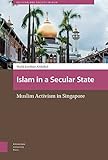Islam in a secular state : Muslim activism in Singapore / Walid Jumblatt Abdullah.
Material type: TextSeries: Religion and society in AsiaPublisher: Amsterdam : Amsterdam University Press, [2021]Description: 1 online resource (304 pages)Content type:
TextSeries: Religion and society in AsiaPublisher: Amsterdam : Amsterdam University Press, [2021]Description: 1 online resource (304 pages)Content type: - 9789048544417
- 9048544416
- 9789463724012
- 946372401X
- 908.8/297/095957 23
- BP63.S55 W35 2021eb
- online - EBSCO
| Item type | Current library | Call number | URL | Status | Notes | Barcode | |
|---|---|---|---|---|---|---|---|
 eBook
eBook
|
Biblioteca "Angelicum" Pont. Univ. S.Tommaso d'Aquino Nuvola online | online - EBSCO (Browse shelf(Opens below)) | Online access | Not for loan (Accesso limitato) | Accesso per gli utenti autorizzati / Access for authorized users | (ebsco)2865521 |
Includes bibliographical references and index.
Online resource; title from PDF title page (EBSCO, viewed March 23, 2021).
The overtly secular state of Singapore has unapologetically maintained an authoritarian approach to governance in the realm of religion. Islam is particularly managed by the state. Muslim activists thus have to meticulously navigate these realities - in addition to being a minority community - in order to maximize their influence in the political system. Significantly, Muslim activists are not a monolith: there exists a multitude of political and theological differences amongst them. This study analyses the following categories of Muslim activists: Islamic religious scholars (ulama), liberal Muslims, and the more conservative-minded individuals. Due to constricting political realities, many activists attempt to align themselves with the state, and call upon the state to be an arbiter in their disagreements with other factions. Though there are activists who challenge the state, these are by far in the minority, and are typically unable to assert their influence in a sustained manner. Bron: Flaptekst, uitgeversinformatie.
1. Introduction : The state, Islam, and Muslim activism in Singapore -- 2. Muslim activism : a survey across the world -- 3. Argument : political opportunities and Muslim strategies -- 4. The Ulama : pragmatism and political acquiescence -- 5. Liberal activists : playing by the system and making gains -- 6. The conservative dilemma : to challenge or accept state proclamations? -- 7. Conclusion.


